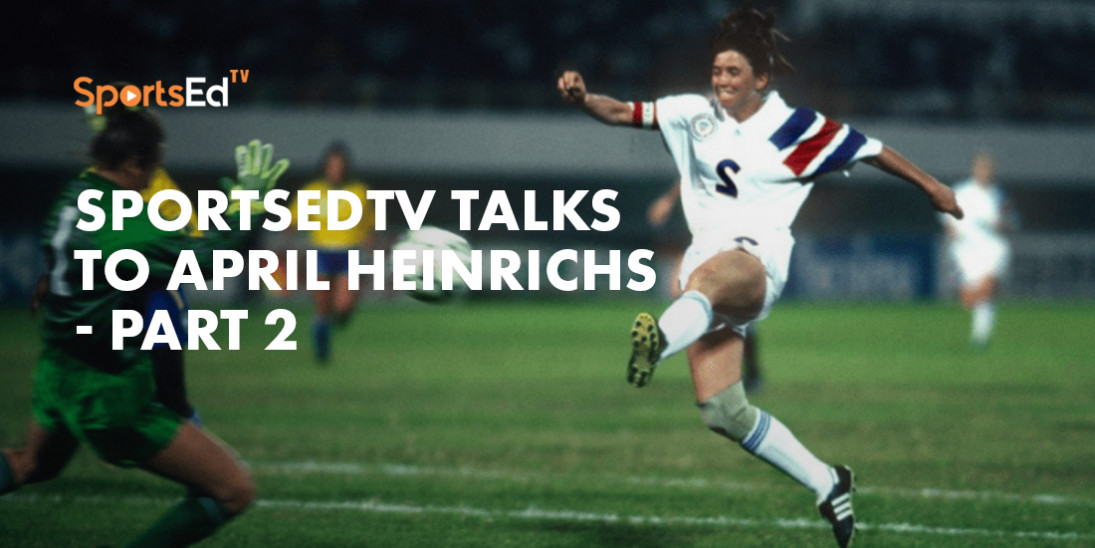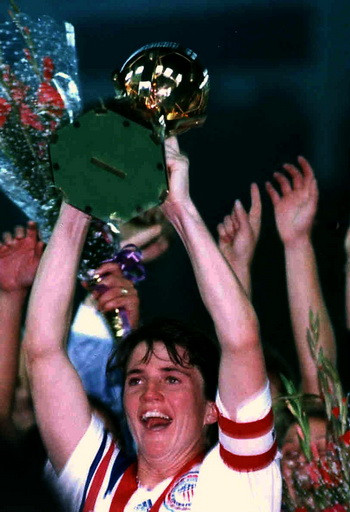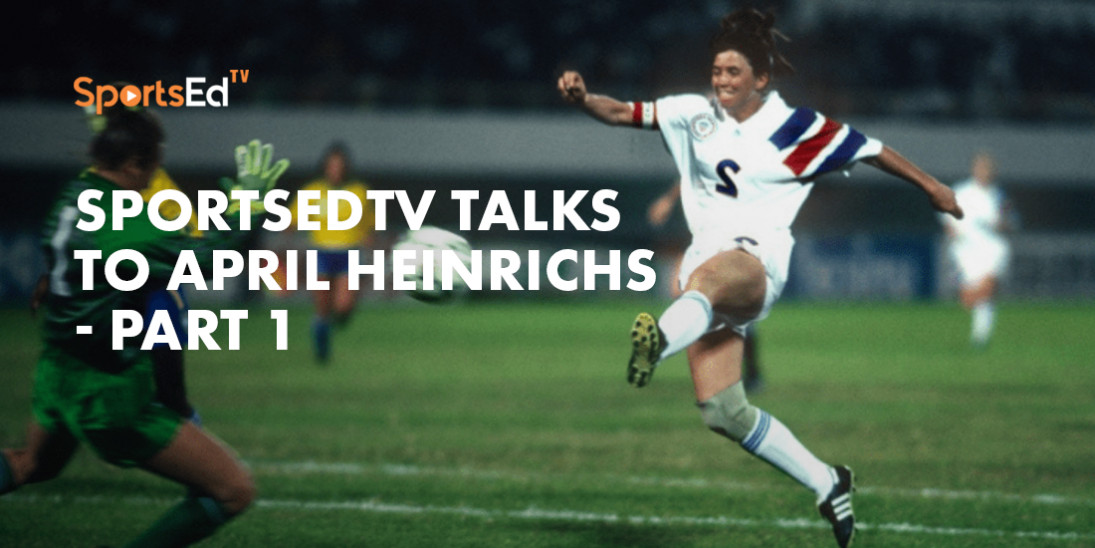Soccer
Welcome and thanks for visiting...

April Heinrichs On Her Playing Career and Transition To Coaching

April Heinrichs captained the US Women's National Team to win the first ever FIFA Women's World Cup in 1991, and in 1998 became the first ever female player inducted into the National Soccer Hall of Fame. She went on to be the head coach of the USWNT and led the team to a silver medal at the 2000 Olympics, 3rd place in the 2003 FIFA World Cup, and a gold medal at the 2004 Olympics. Here, she sits down with SportsEdTV to discuss her life, story, and learnings.
SportsEdTV: What was your experience playing professional soccer in Italy like?
April: Just two or three days after I landed in Italy to join Juventus we were already playing in a game. I remember one training running up stairs in the old Juve stadium that filled something like 70,000 people. It was quite a change to go to another country with a different culture to play soccer, and the adaptation was challenging. Nobody spoke English. The club let me down as well. I was promised a car, an apartment and English classes, none of which ever happened. I was asked to sign a contract in Italian, and I had taken one semester of Italian so there was no chance I could read a contract in Italian. After about two months of that, I was out. I told them, ‘You guys have not come up with everything you said you would provide me with.’ Then next winter I was approached by another Italian team, Prato, which was based in Florence, and thankfully they did everything they said they were going to do. So I was there in total for about a year and a half, and that went much better.
We lived a little bit north of the city. My Italian was slowly improving, and our coach was a little bit old school but I had a lot of respect for him because he really tried hard to make me fit in culturally. He would speak in Italian, and then he would say “Hey, somebody translate.” And then he would check with me, “Do you understand, April?” And most of the time, you know, I got like 10 percent of it, but that was enough. The quality of the games were outstanding. The Italians play a different game of soccer. In the end, I'm very empathetic to players that go abroad. It’s a big challenge to be away from home and adapt to a new culture.
The food is different. Transportation is an issue. The luxuries that we're used to having are not the same. That was one lesson I took away from Italy. Another lesson that I really learned in Italy is that there's not just one way to play or coach soccer. I graduated from the University of North Carolina, where I played for the legendary Anson Dorrance, that was even a little bit before he was probably considered legendary but we thought of him as a legend at that time already. He was coaching men's and women's soccer at North Carolina. He was the national team coach. He was a genius. He was brilliant at motivating us. But I graduated from North Carolina and I left thinking that there's only one way to play. There's only one way to train. And going to Italy, I learned that there were many different ways to approach training and the game that also worked. I didn't agree with the style of play in Italy, we played in a really conservative 4-5-1, and it was lonely up top as that nine, but I saw its effectiveness. The training methods were also not nearly as rigorous as our training methods had been in the USA. I came to both appreciate the different ways to approach the game, and also to value the way we had approached the game in the states. It gave me a better understanding of why we train the way we train.

April Heinrichs playing at the University of North Carolina, prior to moving to Italy to play professional soccer
SportsEdTV: What was the level of play in Italy like at that time?
April: I had a respect for the quality of players I was playing with and against in Italy, it was quite a high level. Even today, there's probably three or four fairly famous women that all played that same year I was there. Carolina Morace from Italy, she's gone on to coach Canada, in Australia, and in Italy. We played against each other in Italy. She was the best player in the country and maybe is considered the best ever still. And then Pia Sundhage coached the Swedish national team, the U.S. national team, and the Brazilian national team. And then Véra Pauw, she played for the Netherlands, coached the Scottish team, coached the Russian team, coached the Netherlands and is currently coaching Ireland. So all of us playing in this top league in Italy went into coaching and our paths were very similar. It was an endearing experience, and great to be among quality players like them.
SportsEdTV: Even though things got better after you moved to Prato, you only spent about a year and a half in Italy. What pulled you away?
April: Yeah, it was short. The experience all in all was difficult. In a foreign country, no transportation, and I was barely making enough money to live. I was considering looking for different careers. The national team was playing maybe twice a year, so that wasn't a career. So I came back to the US and started learning how to become a coach with my mentor, John Ellis. John actually approached me about being my mentor and said he wanted to teach me how to become a great coach because so often great players don't translate into effective coaches. So I left Italy and I worked for him for a couple of years alongside playing for the national team program, which was only two or three times a year. I then went to the College of William and Mary as the assistant coach. I was at William and Mary for two weeks and I said, I want to do this for the rest of my life. I loved coaching at William and Mary. It's also where I coached three or so of my really close friends. They were only a few years younger than me. We're still close friends today. Jill Ellis was on the team. Meghan McCarthy was a national team player, and Julie Shackford is a longtime Princeton coach and she's now the head coach at William and Mary. That experience was so delightful, I knew I wanted to coach the rest of my life. So I started pursuing college coaching opportunities, working for John Ellis, and still training as a national team player.
SportsEdTV: In 1991, you captained the US national team at the first ever Women's World Cup. You scored four goals in the five matches you played in, and led the team to win the World Cup and make history. Tell me about that experience.
 April Heinrichs as captain of the US Women's National Soccer Team
April Heinrichs as captain of the US Women's National Soccer Team
April: The World Cup was the pinnacle of my career. When people ask me what was my greatest experience as a player, it's unequivocally winning the World Cup and the moment that the trophy was handed over to me and I turned to my teammates, that will forever be the peak of my national team career. It's a team sport and we never would have won the World Cup without every one of our players and our coaching staff. And I am incredibly thankful because I actually injured my knee about two months before the World Cup and needed surgery, so I was on crutches for a long time. So I kind of limped my way through that World Cup. I was not at my full capacity. And, you know, thank God we had Karen Jennings and Michelle Akers, and the defense that we had with Carla Overbeck and Linda Hamilton and Lori Henry and our now very famous Julie Foudy and Kristine Lilly and Mia Hamm and Joy Fawcett. It was the pinnacle for me, but I was limping through that World Cup. So it was clear when it ended, that was the time for me to retire because I'd had six knee surgeries in the two years that followed the World Cup.
So that was the last time I ever played professional soccer, in November of 1991. I played a lot of pickup afterwards and strapped a lot of ice on my legs after so many knee surgeries. But I also was 27. I had been one of the oldest on that team. So afterwards, I was a full time division one college coach. I saw that as a path. I did not see being a professional soccer player as a path for me anymore. I did not see how I could make it four more years to the next World Cup in 1995. There was no way I could support myself financially from it, either. My father passed away in 1988, so that financial support wasn’t there, and on top of that all of the knee surgeries, it was clear that it was time for me to move on.
SportsEdTV: You transitioned into full time coaching next, and since you’ve coached a few different university teams and also the women's national team. I know you said you fell in love with it right away. Tell me about the experiences of coaching and the challenges of it. Was it what you expected it would be?
April: You know, nothing was what I expected it to be. Who would have thought growing up in Colorado that I'd go get a college education and play college soccer on a scholarship? I never thought that. Play professional soccer? Never thought that would be possible. There really weren't any full time coaching careers in women's sports at the time either, so I never thought that was an option either. None of it was planned. However, once I finished college and my national team days were coming to an end, people weren't calling me and saying, ‘Hey April, can you move to Los Angeles and help us film this movie called E.T.?’ They were calling me and saying, ‘Hey, are you interested in being a coach or an assistant?’ So I figured coaching might be the right path over film! I was pretty lucky to be recruited to be an assistant, and working in the game. I was making more money in my first full time college coaching job at Princeton University than I ever did from the national team. Afterwards players were making that kind of money, but before that, when I was playing, we never did. So you know, I would have had to hold on for another eight years or so to make that kind of money as a soccer player. That wasn’t an option, so I went into coaching. It was a pretty smooth transition, all in all.
SportsEdTV: What was the beginning of your coaching career like? Were there some surprises you had to adapt to?
April: I quickly learned that I needed to modify my personality and the way I organize. Anson Dorrance had provided me with all of the structure, he had taught me how to focus on motivation and the psychological aspect of sport, and how to be organized and a good planner. I adopted all of that from him. Now, I had to start learning how to run training sessions, how to stack one training session after another, and how to plan a season. John Ellis is the first person that ever said to me, ‘Can you write me a season plan?’ I'm like, ‘What is the season plan? I've never heard of that’. All in all though, this transition to coaching, in around 1988, was pretty seamless. I fell in love with coaching from the start. It grabbed my heart and my attention and my focus and my gritty personality as much as playing did. There's still nothing like scoring a goal in a game, but being a national team coach, or a college coach and a youth national team coach, was a really close second and I fell in love with it immediately.
Part 3 is coming soon! Follow us on Facebook and Instagram so you don't miss it.





